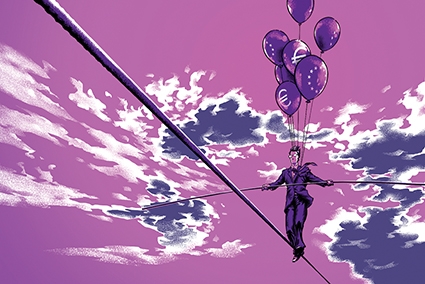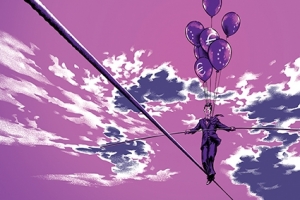Russia Sitting Pretty: Ogden on Georgia Walking the Political Tightrope
OPED
Had Socrates been in Georgia in August 2008, no doubt he’d have said something suitably philosophical about war and the folly of man – not that he’d have had much chance; he’d probably have had an AK47 thrust into his arms and then bungled on a bus bound for Gori, before being hastily brought back to Tbilisi when the Russians hove in sight.
That, you’ll gather, is my enduring impression of the Georgia-Russia war of 2008 (the chaos, I mean, not the hypothetical presence of Greek philosophers). I’ve heard stories of Georgians with prior military experience scrambling to volunteer to get back in uniform and fight off the invader, only to arrive at military depots and been given empty rifles; likewise, I’ve heard of people who’ve never done a day’s service in uniform be issued equipment that even Rambo might have raised his eyebrow at. Then there are the tales of overwhelming Russian air power, despite American and European reports of one of the few Georgian success stories of that war being the downing of numerous Russian aircraft and the deaths of their pilots.
Naturally, the fear that it all might happen again has never gone away, especially with the thousands of Russian troops sitting pretty in South Ossetia and Abkhazia, and Moscow and Tbilisi’s relations remaining hostile. Russia’s intervention in Ukraine – predictably unchallenged by the West beyond the regular sycophantic chant of ‘strong condemnation’ – led some in Georgia to believe that Russian forces would come rolling over the hills again in the near future.
This week’s flare up between Azerbaijan and Armenia over Nagorno-Karabakh (which has already resulted in the loss of thirty lives) has caused the old worry to come back once more, especially due to rumours of a Russian request to use Georgian airspace in order to assist its Armenian allies. Georgians are worried that if Russia officially requests permission to transit its military forces through Georgia (as per a pre-2008 war agreement between Russia and Georgia), Tbilisi will deny the request and thus provoke Russia into finding a more aggressive way of getting its forces into Armenia.
While hardly an impossible scenario, it remains unlikely. The European and American publics are becoming increasingly tired with Islamic extremism in general and the Islamic State in particular, and with Russia’s intervention in Syria, President Putin has managed to rebrand his country as an international peacekeeper, far from the image cultivated by the West of the Russian bear bullying its smaller neighbours.
The West’s support of a number of Syrian rebel factions was strongly criticised by some media outlets when it emerged that a number of these groups are linked with (or sympathetic to) Al-Qaeda; the new perception of Ba’athism contends that while it is indeed a brutal form of fascism, it does not compare with the barbarism of the Islamic State: between the Scylla of Al-Qaeda rebels and the Charybdis of IS, Russian-backed President Al-Assad is cast in a more favourable light.
Russia’s brief campaign of support for the Syrian government propped up the regime, bloodied the nose of the Islamic State and retired in good order (a far cry from the Western quagmires of the Afghan and Iraq wars). With an increasing number of IS attacks in Europe, some segments of the Western public view military intervention in Syria as being the only way to prevent terrorist activity on the continent, since any criticism of Islamic immigration and integration in Europe being a metaphorical minefield laced with words such as ‘discrimination’ and ‘prejudice’. It is hardly surprising that many are describing Russia as fighting a European war that Brussels is unwilling to wage.
In this way, any further aggression towards Georgia at this time would badly damage the new perception of Moscow as a sensible international policeman. If Russia requests the use of Georgian airspace and Georgia declines, it will serve solely to enhance Moscow’s image and damage Tbilisi’s; given Russia’s past form, it will not be hard to spin the outbreak of fighting in Nagorno-Karabakh as being the fault of Azerbaijan (and it might well have been, for all we know). Georgia, then, will be seen as spitefully preventing Russian peacekeepers from being allowed to restore order and end the fighting.
The rebrand of Russia’s image has served to change the perception of Moscow amongst the Western public, which in turn might cause European and American politicians’ attitude to change as a result; this could have a number of positive outcomes for Russia, such as the lifting of the West’s sanctions and unfreezing Russian assets in Europe and North America.
For its part, Georgia had best be careful walking the diplomatic tightrope, especially as the government is becoming increasingly fractured and October’s elections draw ever closer. It is, as I like to tell my friends, a damn good (or interesting; pick one) time to live here.
Tim Ogden












